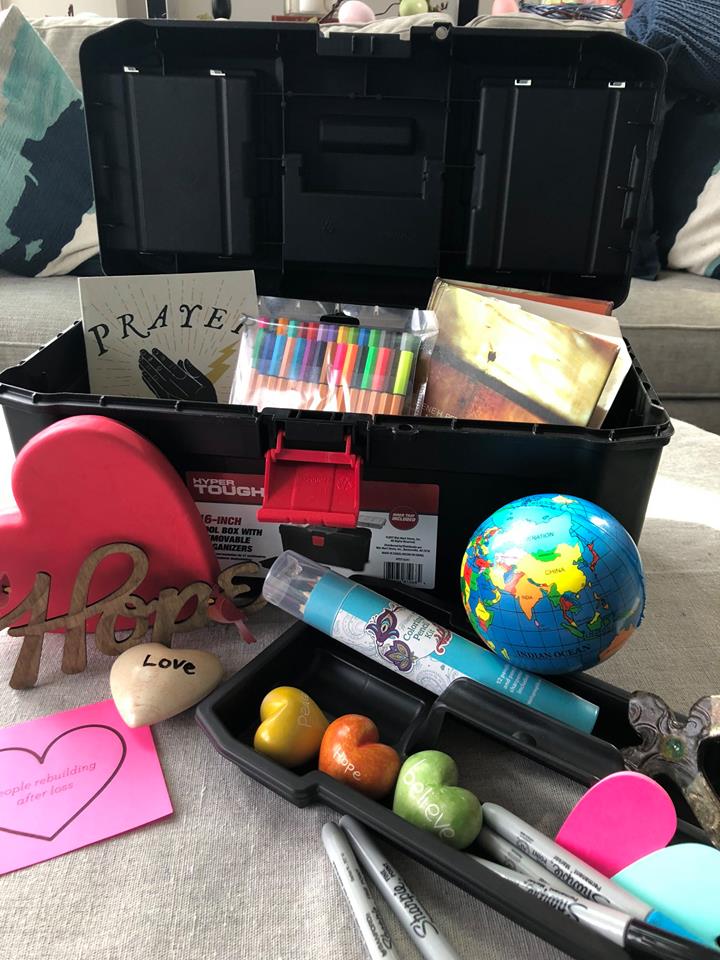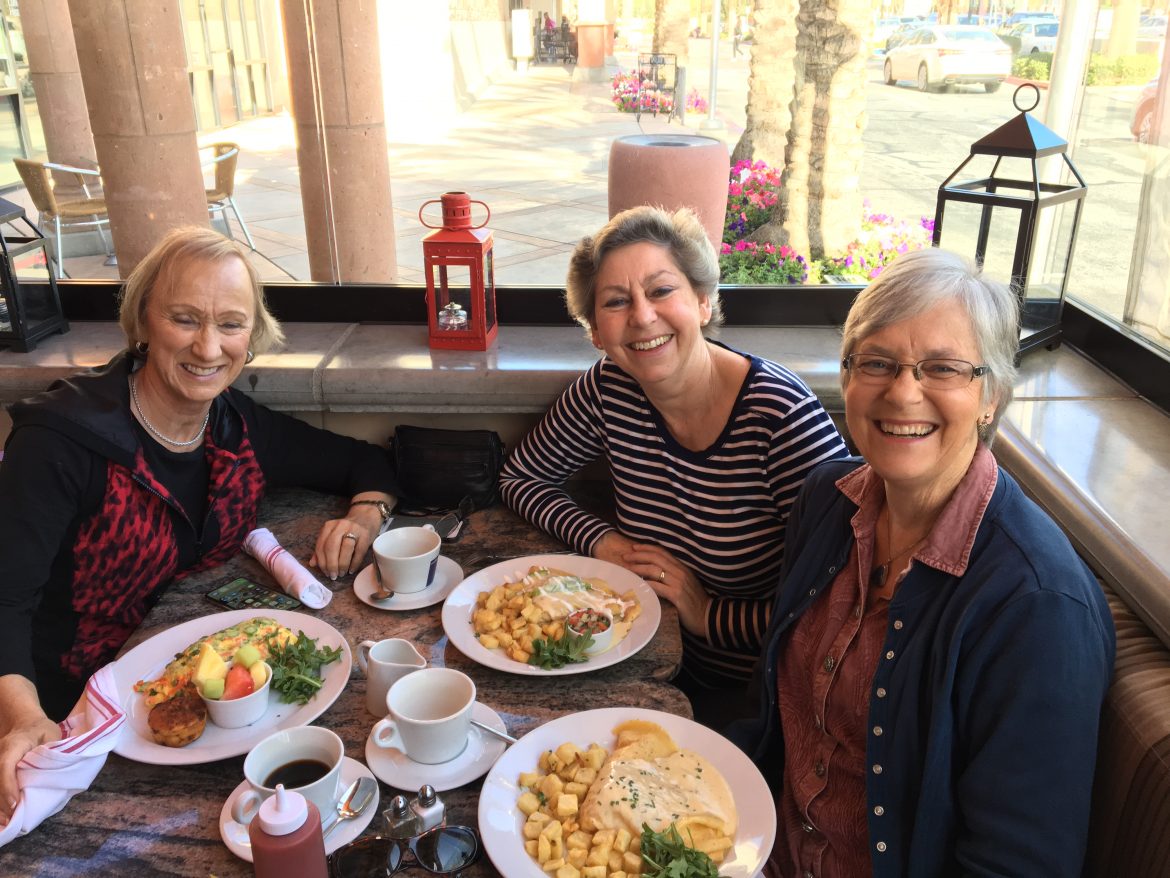The Immigrant’s Creed
A profession of the Christian faith through the experience of an immigrant.
I believe in Almighty God,
who guided the people in exile and in exodus,
the God of Joseph in Egypt and Daniel in Babylon,
the God of foreigners and immigrants.
I believe in Jesus Christ,
a displaced Galilean,
who was born away from his people and his home,
who fled his country with his parents when his life was in danger,
and returning to his own country suffered the oppression
of the tyrant Pontius Pilate, the servant of a foreign power,
who then was persecuted, beaten, and finally tortured,
accused and condemned to death unjustly.
But on the third day, this scorned Jesus rose from the dead,
not as a foreigner but to offer us citizenship in heaven.
I believe in the Holy Spirit,
the eternal immigrant from God’s kingdom among us,
who speaks all languages, lives in all countries,
and reunites all races.
I believe that the church is the secure home
for the foreigner and for all believers who constitute it,
who speak the same language and have the same purpose.
I believe that the communion of the saints begins
when we accept the diversity of the saints.
I believe in the forgiveness of sin, which makes us all equal,
and in reconciliation, which identifies us more
than does race, language, or nationality.
I believe that in the resurrection
God will unite us as one people
in which all are distinct
and all are alike at the same time.
Beyond this world, I believe in life eternal
in which no one will be an immigrant
but all will be citizens of God’s kingdom,
which will never end. Amen.
“The Immigrants’ Creed” is excerpted from The Book of Common Worship: 2018 Edition. © 2018 Westminster John Knox Press. To purchase the book, please visit any of these websites:
Westminster John Knox Press
The Thoughtful Christian
PC(USA) Store
By Keren Dibbens-Wyatt —
“For it is commendable if someone bears up under the pain of unjust suffering because they are conscious of God.” 1 Peter 2:19
In his first letter, Peter tells wives and slaves (in the first century there seems little difference in point of law) that they ought to put up with unjust, even violent mistreatment. This sounds like utter foolishness to our modern ears. Sadly though, this text has been used as an argument in favour of slavery in the past, and is still dragged out of context by pastors today to tell women they should stick by abusive husbands even if it means they or their children are in danger.
But Peter is not justifying slavery or wife-beating. I’m quite sure he abhorred both. But when he was writing, women had no power to divorce their husbands and very rarely to keep their own income, and slavery was also part of the norm. These behaviours were entirely legal, and battered wives and beaten slaves had no recourse to authority to protect them. Now, thank God, there are laws to help us, and neither thing is acceptable (whatever some churches have sadly said to abused women). So at the time Peter was writing, unless they fled, they did have to bear the ill-treatment.
 Peter is talking about how they might do this as followers of Christ. His point is about attitude, and is simply this: it is how we respond to brokenness, both in ourselves and in others, that spreads the gospel message. We should have a lived-out attitude that endures unfairness and returns love for evil, emulating Christ as suffering Messiah. That is the difference the world needs to see in us, precisely because it seems foolish. This is truly being counter-cultural, not how different our church café or our worship services are. This is the upside-down kingdom of God that runs, like St Francis, to kiss a disfigured leper, or crosses the road to help someone of a different religion, like the Good Samaritan in Jesus’ parable.
Peter is talking about how they might do this as followers of Christ. His point is about attitude, and is simply this: it is how we respond to brokenness, both in ourselves and in others, that spreads the gospel message. We should have a lived-out attitude that endures unfairness and returns love for evil, emulating Christ as suffering Messiah. That is the difference the world needs to see in us, precisely because it seems foolish. This is truly being counter-cultural, not how different our church café or our worship services are. This is the upside-down kingdom of God that runs, like St Francis, to kiss a disfigured leper, or crosses the road to help someone of a different religion, like the Good Samaritan in Jesus’ parable.
Jesus talked of course, about turning the other cheek. He was not instructing us to be passive doormats (one only has to study his interactions with the Pharisees to see this). Again, like Peter, he was talking about the attitude we need to display when dealing with unfair treatment. The world says strike back, get your due, have revenge, and the Jewish way had always been “an eye for an eye,” as he reminds us. But love doesn’t act like that. Love bears all things and keeps no record of wrongs (1 Corinthians 13). What a hard thing love is to live out! And so ridiculous! Who can live this way? As the Disciples (and me, if I’m honest) retorted to one of the Lord’s new commandments, “Who then, can be saved?”
Well, Jesus lived this way. He died this way too. When he was accused, spat on, derided, beaten, flogged, taunted, dragged through the streets and crucified, he could have brought all of heaven’s armies down to wreak revenge and free himself. He chose very deliberately to instead follow the via dolorosa to its inevitable end. Was he a fool? Why do this thing? Why act this way?
Because this is what love does. We do not seek out suffering, but where it is necessary or unavoidable in our pursuit of love, we have a different way. The foolish, selfless, wonderful, beautiful, holy love of God is not thinking of itself, but of others. It is saying there is another way to handle this. It is saying, I will take this undeserved punishment and give you, in return, only forgiveness. It is saying, I refuse the label of victim, and refuse to label you as perpetrator, for you know not what you do. It is preposterous. It is utter foolishness. It is how we redeem ill-treatment and transform suffering and wounds into resurrection life.
Unwarranted suffering, given to God, becomes a gateway to love and transfiguration. The foolishness of the cross, of submitting to one another in love (Ephesians 5), of rejoicing in all trials and tribulations (James 1) should mark out our lives as disciples of Christ, knowing as we do that pain and suffering precedes new life, just as winter comes before spring. As holy fools, we are already living in the wholeness of eternity, and preaching wisdom deeper than the world can grasp.
“For since in the wisdom of God the world through its wisdom did not know him, God was pleased through the foolishness of what was preached to save those who believe.” 1 Corinthians 1:21
by Christine Sine
The last couple of weeks have been very special for me. I spent several days in Palm Springs with Ruth Austin and Cheryl Mackey whom I roomed with when I first joined Mercy Ships in 1981. I then flew to San Francisco to spend the day with Kathryn Mar, who with her husband Doug, formed part of the early medical team on the original Mercy Ship, the M/V Anastasis. Together we dreamed and plotted and planned, slowly creating a tiny hospital that was the embryo from which Mercy Ships Medical Ministry was birthed. We also shared many incredible experiences, like the time 8,000 fish landed on the shore in front of where we were staying in Greece, which is depicted in the photo above.
On Friday maxilla-facial surgeon Dr Gary Parker, whom I recruited for our initial cleft lip and palate outreach in 1987 came to lunch together with his wife Susan. They have spent their lives on the ships, raised two kids and dedicated themselves to providing health care for some of the world’s most vulnerable. I listened in awe as Gary told stories of what has come out of the ministry I had the privilege of helping give birth to. Susan reminded me too of this prayer which I wrote several years ago especially for Mercy Ships which is still frequently shared with the crew, volunteers and donors. As I read through it again today I realized that it is important not just for those on the ships but for so many of us who work to bring justice and relieve suffering in our hurting world.

AFRICA MERCY REAR VIEW, FROM WATER
An Africa Mercy Community Prayer
Merciful Father,
You have called us from many tribes and nations,
Drawn us from many cultures and creeds,
As rich and poor, young and old,
You have embraced us together with all the hurting people of this world,
You have welcomed us as part of your eternal family.
Compassionate Christ,
You have shown us so much of the world’s injustice and pain,
And in its midst you are always there.
Let us see you in those with deformed faces and broken lives.
Let us hear you in the grieving and the oppressed,
Let us know you in the hungry and the vulnerable,
Transforming Spirit,
You whose indwelling presence brings renewal and restoration,
Flow through our hands and pour out healing,
Flow from our hearts, extend hope to the hopeless,
Flow through our lives with saving grace,
Flow through all we do and make others whole.
Eternal God, Creator, Redeemer, Comforter,
One in essence, Three in person,
Touch and transfigure us,
Let your love grow strong and deep within us.
Let your compassion bloom and overflow through us,
Let your righteousness bear fruit of mercy love and justice,
Until your world is changed,
And all creation is restored and made new.
After Gary and Susan left, I explored their daughter Carys’s vlog and wanted to share this glimpse with you.
All these friendships provided wonderful opportunities to tell stories, reminisce and remind ourselves of how God met us in the most unlikely situations. So many foolish things we got to participate in, so many miraculous results. It was renewing, faith building and rejuvenating to recount them.
Stories Matter
We all love to know that our stories matter and delight in recounting them to friends. What I didn’t realize until recently is what incredible benefits for our well being this type of retelling has.
In Brain Rules for Aging Well:10 Principles for Staying Vital, Happy and Sharp, molecular biologist John Medina documents the surprising research that shows how important reminiscing and nostalgia are for our bodies. Nostalgia promotes something called self-continuity linking who we were in the past with who we are now. When we reminisce, social connectedness increases, our sense of fulfillment in what we have accomplished increases, and positive memories rise to the surface. When we immerse ourselves in memories of our younger selves, we become healthy, our aches and pains are reduced, our weight and posture improve and our dexterity increases. Even our eyesight gets better.1 It makes me wonder what it does for our spiritual health too.
Telling our stories is powerful, even when there is pain and trauma we are uncertain about revisiting and it is far more than the nostalgia effect. Reminiscing often unveil the invisible hand of a loving God who shaped and guided us to become the people we are. When we neglect these stories, they hold us prisoner to fear and pain. Retelling them is an invitation to the exhilarating adventure of an awakened and full life.
Retell Your Story
Perhaps you too would like to reminisce and reflect on the experiences in your life that have shaped you.
Sit in your favourite chair and relax. Take some deep breaths in and out. Close your eyes and visualize the God who took delight in lovingly crafting you in your mother’s womb, nurtured you as you stumbled through the first hesitant steps of childhood, and grappled with the challenges of life. Picture God reaching down and rescuing you from your mistakes and brokenness because of that delight. Remind yourself of how special and unique your journey is and how proud God is of you.
Write Some Stories
Pull out your journal. Recount the story of your birth and the first year of your life. Where are you aware of God in this beginning point in your life? What do you think God enjoyed about your birth? Continue to reflect on those early days. What is your earliest memory of the love of God? What about the rest of your journey?
 This photo above is of the Anastasis when I first joined it in Greece, not only a very important part of my life journey but also one that gives me much joy. Tell a story about the joy spots in your life journey. Compose another that highlights the struggling points in your life.
This photo above is of the Anastasis when I first joined it in Greece, not only a very important part of my life journey but also one that gives me much joy. Tell a story about the joy spots in your life journey. Compose another that highlights the struggling points in your life.
Read prayerfully through these stories: What made you feel close to God and when did you feel distanced from God? What were the practices that sustained you and brought joy to your life?
Draw a Picture
Find a big piece of paper and some colored pencils or pens. Draw a picture of your life journey as recounted in your stories. I suggest you draw a rough sketch in pencil first and then use colored pencils or pens to highlight the joy spots. Then color the struggling points. Allow your memories and the stirrings of your heart to choose the colors for you.
Enter the Joy of God
Prayerfully reflect on your picture. Dialogue with the image. Do you sense God’s joy in your journey and the person you have become? What parts of your story make you most aware of God’s enjoyment of you?
What practices enhance your awareness of God’s enjoyment ? How could you nurture and strengthen these? Respond to your impressions in writing, poetry, painting, music or whatever form of creative expression you enjoy.
If you are interested in purchasing a copy of Tales of A Seasick Doctor which recounts my story of life on the M/V Anastasis please email me at seasickdoctor@gmail.com
By Lilly Lewin
When we were little, most of us had a collection of things that we kept safe …we had a box of treasures that we collected along the way that reminded us of special times and places, and often just stuff we liked that we wanted to keep with us. Some of us still have these collections, we have shoeboxes, jars, or even scrapbooks with pictures and items that remind us of special people and special places and times that we don’t want to forget.
The Bible is filled with tangible reminders like these. God knew, and knows that we humans easily forget. We forget what God has done for us, so God uses tangible symbols to help us remember. Consider the Passover Feast, the annual reminder that God delivered his people from Egypt, or the tower of rocks in Joshua, built when crossing the Jordan River into the Promised Land. The annual festivals also reminded the children of Israel of the provision of God.
And all the sacrifices and offerings in the temple were tangible reminders…smelly, dirty, and physical reminders of what God was up to, and helped the children of Israel engage their God.
Like the children of Israel, we also need tangible, touchable ways to engage God. We all need symbols to help us remember and to remind us of what God has done, and what God is doing in our lives. We really need a tool box to carry with us on our journey so we have the tools we need to engage God and remember God’s goodness.
So why not start a collection? Why not start your own Spiritual Tool Box?
Find a box, make one, or buy one. One that brings you joy just to look at it or even a real tool box!
The ideal box would be large enough to hold a Bible and a Journal along with other symbols photos, objects that can help you connect with Jesus.
Here are some questions to ask yourself as you begin. These questions and activities can help you begin a life long every day engagement with Jesus. Providing tools for the journey.
What things help you connect with God?
What books, images, photos, symbols remind you of God and what God has done in your life so far?
Maybe you come up blank…maybe you’ve never thought of this at all.
So first, think of a time and place where you’ve felt close to God…
Picture that place or that setting…maybe it’s outside in nature, maybe it was while you were hiking, running, at camp or on vacation. Maybe it was spending time at the lake, beach or mountains, may be it was while you were looking at the stars or creating something, or playing music.
Find an object or objects, or photographs that remind you of this place or these times.Place these objects and/or photographs in your box.
As an additional experience, you might create a collage of pictures that
speak to you of places and experiences where you have felt God’s presence. Or a collage or drawing with words and pictures that remind you of God’s goodness and mercy.
What else could you keep in your box?
Art supplies, a sketch pad
Photos to remind you to pray for friends or family members.
A map of the world or a small globe. I found a ball at the dollar store that had a map of the world on it to help me pray for global issues.
Something local to help you pray for your neighborhood or town.
Lyrics to a favorite song or two.
The Children of Israel had a series of psalms they sang as they made their pilgrimage to Jerusalem every year. Is there a song that when you hear it reminds you of God…or helps you connect with God ? It doesn’t have to be a “Christian” song. What songs really speak to you? Write down or print out the words to the song…keep that in your tool box
When I did this practice with my youth group students, I gave out actual Tool boxes to keep their bibles, journals and the symbols and treasures in. The idea was they would keep the box handy and have it for their devotion times, encouraging them to spend more time with God. So this is a great practice to do for yourself and with your own kids, or students in your church community. All ages can start this practice! And the symbols and items in your spiritual tool box and can change and grow as your age and relationship with Jesus changes and grows! Be creative and use your imagination!
What would you like to put in your Spiritual Tool Box?
What things would bring you joy? What things would encourage you to be with Jesus and to engage God? What things would help you spend time falling more in love with Jesus? Consider the Practice of the Spiritual Tool Box!
By John Birch —
By Jamie Arpin-Ricci —
On June 12, 2016, a 29-year-old security guard named Omar Mateen entered the Pulse nightclub in Orlando armed to kill. In what became the deadliest act of violence against LGBTQ+ people in American history, Mateen killed 49 people and wounded 58 more, before being shot and killed by police.
Like most gay bars and nightclubs, Pulse was a place of refuge and community for many LGBTQ+ people in Orlando. In a world where they were never quite sure who around them was safe to be open about who they were, Pulse was a place where they could let their guard down and be themselves. And in an instant that was all taken away in the most horrifying way possible.
As quickly as the headlines swept across the nation, sadly, so too did the public commentary by those who believed being “queer” was wrong. Much of it amounted to: “What did they expect? If you are going to flaunt your lifestyle, things like this are bound to happen.” Some even went so far as to say that such an outcome was God’s justice. The terror from the event, combined with the all too common public criticism, pushed many LGBTQ+ people deeper into silence and isolation. To many, it felt dangerous and foolish to put themselves out there.
Having written (cautiously) about my own journey as a bisexual pastor, I found myself suddenly inundated by emails, messages, and phone calls from LGBTQ+ Christians. From transgender youth trying to live authentically to middle-aged pastors struggling to come to terms with being gay, the desperate cry for support, understanding, and safety nearly overwhelmed me.
I also heard from pastors, parents, and friends. They were all broken by the tragedy and conflicted that so much of the negative public response was coming from Christians, making them hesitant to express even the most general public support or sympathy. They wanted to understand. They wanted to learn without being beat over the head with unhelpful claims that “the Bible clearly says…”. And I tried, as best I could, to offer what support and encouragement I could provide.
More than anything else, the sense of fear and isolation was the most common thread in all the stories I heard. After much prayer, I realized that I could help by making space and stepping out. And so I decided to be more bold, clear, and direct in telling own story, sharing my conviction that my bisexuality was no less a reflection of the image of God that I was created in than any other part of myself. And I hoped that, in putting myself out there, I might make it even a little easier for some others to do the same and get the help and support they needed.
However, when my wife & I discussed it, we also realized that to do so would put us at risk. As missionaries who reply upon donation to do what we do, we knew all too well that such a decision would likely cost us financially. With one child and another on the way at the time, it seemed like a foolish risk to take. In the end, however, we decided that our foolish risk was a small price to pay to help the countless we’d seen suffering.
Since that decision, our lives have changed significantly. The ministry supporting fellow LGBTQ+ believers walk into celebrated wholeness has become a central focus of my time and energy. I even received an award for my efforts (which, in turn, ended up costing us). We have been humbled to see lives transformed, inviting us to walk their courageous journey with them.
The foolishness of Christ is precisely this: When we love with the radical abandon of Jesus, we are freed from self-serving fear that holds us back, and we encounter Him in one another in ways that we can hardly imagine.

by Christine Sine
Today is International Women’s Day, a day that you can imagine I find particularly relevant. I love to reflect on the maternal images of God, and always replay this video I made several years ago.
This year it has seemed particularly meaningful as we all struggle with the implications of the #metoo movement and the growing recognition that equality for the sexes is still far from a reality.
I also love to reflect on some of the strong women in the Bible who are increasingly providing role models for me and other women. Women like Mary Magdalene whom I talked about in my post Why Do We Abuse Women?

Then there are the women of today, like Michelle Obama and the 2 year old she inspired, who stand out as examples of strong and beautiful role models.

Official portrait of First Lady Michelle Obama in the Green Room of the White House, Feb. 12, 2013. (Official White House Photo by Chuck Kennedy)
Then there are the role models of women friends who have stood with me through the years like my friends Ruth and Cheryl in the photo at the beginning of this article.
Last but not least, I love to reread this prayer, which I came across several years ago based on the Franciscan prayer Make me an instrument.
As an Amazon Associate, I receive a small amount for purchases made through appropriate links.
Thank you for supporting Godspace in this way.
When referencing or quoting Godspace Light, please be sure to include the Author (Christine Sine unless otherwise noted), the Title of the article or resource, the Source link where appropriate, and ©Godspacelight.com. Thank you!






